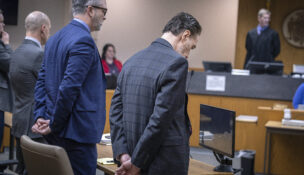Lawyers divided over proposal
By: dmc-admin//March 23, 2009//
A 14-year-old law that established negligence thresholds in personal injury and medical malpractice cases could be amended by a provision in Gov. Jim Doyle’s 2009-11 budget.
Doyle seeks to alter current joint and several liability standards that require a defendant be found at least 51 percent negligent to be liable for full damages. The proposed change would only require that a defendant’s negligence be equal to or greater than that of the person seeking recovery.
While plaintiff’s attorneys are heralding the provision as a “restoration of consumer rights,” civil defense lawyers and members of an equal justice lobbying group say the change will expose businesses to unfair liability assessments.
“This change potentially makes a defendant have to pay more than their fair share, which under current law is basically a compromise,” said defense attorney Robert J. Lauer, of Kasdorf, Lewis & Swietlik S.C. in Milwaukee.
Differing Views Lauer, president of the Civil Trial Counsel of Wisconsin (CTCW), said the revision would potentially leave defendants found to be only 1 percent negligent liable for 100 percent of the damages.
“There is some real injustice there,” Lauer said.
But according to attorney Mark L. Thomsen, president of the Wisconsin Association for Justice, the change simply ensures the right people are held responsible.
“Historically, the joint and several principle placed responsibility on the wrongdoers and it should not put the burden on the innocent person to go sue everybody,” said Thomsen, of Cannon & Dunphy S.C. (http://www.cannon-dunphy.com/) in Brookfield.
Thomsen represented one of the victims injured in the explosion at the Falk manufacturing plant in 2006. He said that under the current joint and several standards, his client was limited in the amount of money that could be recovered, despite the fact that the workers’ compensation carriers were entitled to full remedy.
“To me it’s not a business question, but a question of why should an innocent worker, who shows up for work and the place blows up, have to bear the burden of the loss.” Thomsen said. “I don’t think innocent people should be paying the bill.”
Deep Pockets
Robert Fassbender, spokesperson for the newly created Wisconsin Civil Justice Council Inc. said the restoration of the law, combined with another provision in the budget which allows plaintiff’s lawyers to target “deep pocket” businesses, will promote lawsuit abuse.
Doyle’s proposal indicates that in civil actions involving contributory negligence, jurors would be told what effect findings of negligence for each party will have on awards and liabilities.
“The traditional roll of a jury is as fact finders, not applicators of the law,” Fassbender said.
“Basically, this explains to the jury how the lottery is played.”
While he did not suggest plaintiffs will become more sympathetic in the eyes of jurors, Fassbender said that the changes will increase the likelihood that attorneys will search for “tangential” defendants in order to get substantial recoveries.
Thomsen said he does not expect the change will promote more lawsuits given that prior to the change in 1995, jury verdicts were generally on the conservative side.
“I don’t see any data that means more lawsuits,” Thomsen said. “From the plaintiff’s point of view, if we go back to where we were pre-1995, if we believe someone is a legitimate contributor to losses, we can bring them in on a third-party action.”
Thomsen said he is hopeful the provisions will pass in the final version of the budget, but Fassbender said any changes should be first considered by the legislature and not “hidden” in a 1,800-page budget bill.
Lauer also suggested that the proposal should have been discussed more thoroughly by the legal community and businesses before being presented for passage.
“It did strike me as odd that it was included in the budget, and I think the hope was that there was going to be more discussion because it’s going to have a far-reaching impact on tort law in Wisconsin,” Lauer said.
Legislators are currently reviewing Doyle’s proposed budget. After the Joint Finance Committee completes its review of the budget, and any changes or recommendations are made, additional revisions can be made by the Assembly and Senate.
Legal News
- Former Trump staffer who said to ‘fan the flame’ after 2020 loss hired to lead Wisconsin GOP
- Gov. Evers appoints David Casey to Serve as DOR Secretary
- FBI launches criminal investigation into Key Bridge collapse
- Man charged in slaying after woman’s leg found at Milwaukee-area park
- Minnesota man guilty in fatal stabbing of teen on Wisconsin river, jury finds
- Wisconsin teen sentenced in bonfire explosion that burned at least 17
- Wisconsin man who broke into home, ate victim’s chicken, slept in victim’s bed, receives prison and jail sentences
- Judge refuses to dismiss Hunter Biden’s gun case
- House passes reauthorization of key US surveillance program after days of upheaval over changes
- Milwaukee Police officer traveling to Georgia training retires before facing discipline
- Evers to ask legislature to approve largest increase in state support for UW System in two decades
- 7th Circuit Court of Appeals proposes new rules
WLJ People
- Power 30 Personal Injury Attorneys – Russell Nicolet
- Power 30 Personal Injury Attorneys – Benjamin Nicolet
- Power 30 Personal Injury Attorneys – Dustin T. Woehl
- Power 30 Personal Injury Attorneys – Katherine Metzger
- Power 30 Personal Injury Attorneys – Joseph Ryan
- Power 30 Personal Injury Attorneys – James M. Ryan
- Power 30 Personal Injury Attorneys – Dana Wachs
- Power 30 Personal Injury Attorneys – Mark L. Thomsen
- Power 30 Personal Injury Attorneys – Matthew Lein
- Power 30 Personal Injury Attorneys – Jeffrey A. Pitman
- Power 30 Personal Injury Attorneys – William Pemberton
- Power 30 Personal Injury Attorneys – Howard S. Sicula











